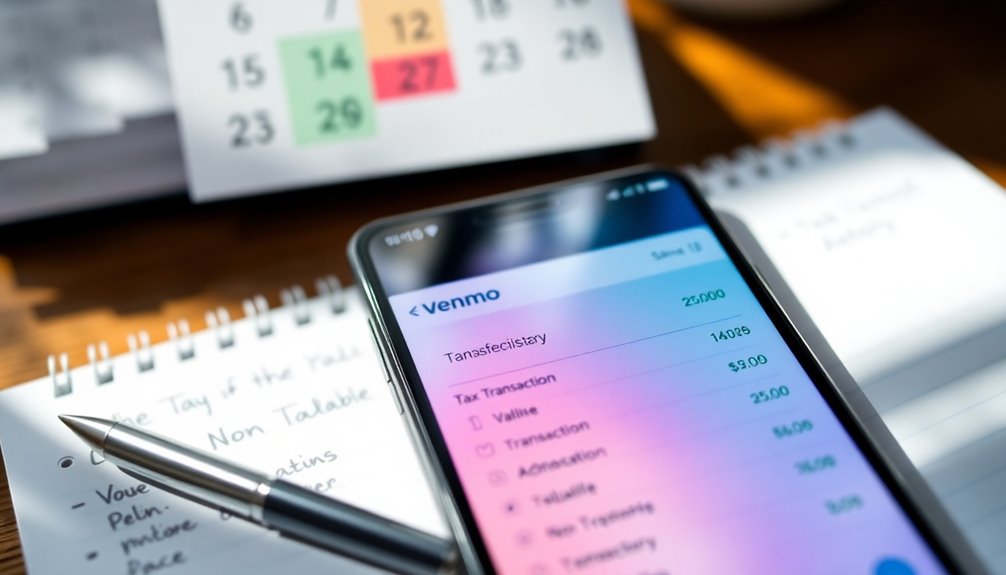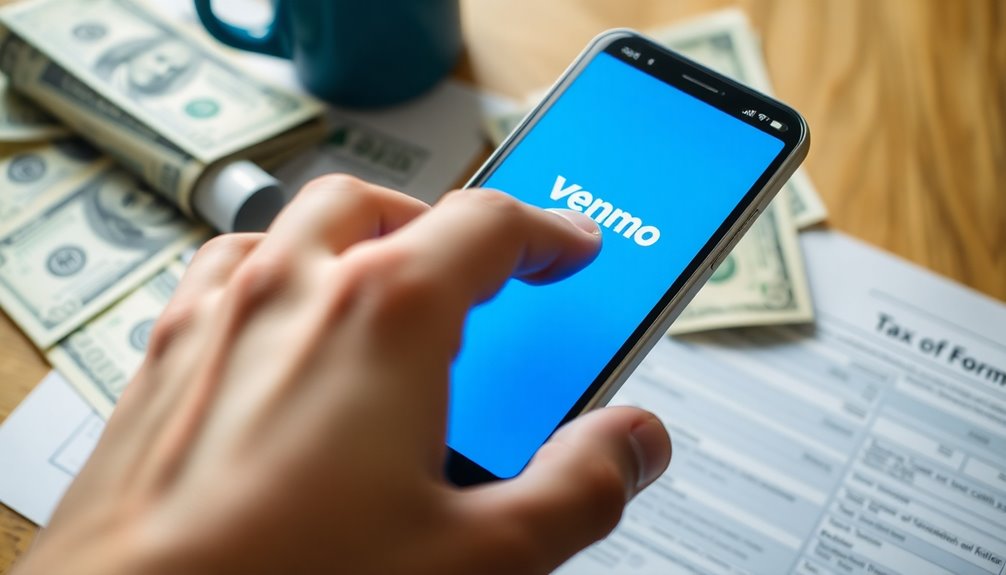You may need to pay taxes on certain Venmo transactions, especially if you're using it for business or receiving payment for goods and services. Personal gifts and shared expenses generally aren't taxable, but income from self-employment is. If your total payments exceed $600, you'll receive Form 1099-K, which details your earnings. The IRS requires you to report all taxable income, even if you don't get this form. Keeping detailed records is crucial for compliance. Want to make sure you're on track? There's plenty more to understand about managing your tax responsibilities effectively.
Key Takeaways
- Payments for goods and services via Venmo are taxable and require reporting to the IRS.
- Personal gifts and shared expenses sent through Venmo are generally non-taxable transactions.
- If you exceed $600 in taxable payments, Form 1099-K will be issued by January 31.
- Maintain detailed records of all transactions to support income reported on tax returns.
- Mixing personal and business transactions can complicate tax reporting and may incur backup withholding.
Understanding Venmo Payments

When you use Venmo, it's essential to understand how payments work to manage your transactions effectively. You can fund your Venmo account using various methods, including debit cards, checking accounts, credit cards, and prepaid debit cards. However, remember that savings accounts aren't an option for funding.
When making transactions, you should be aware of the fees involved. Instant transfers come with a 1.75% fee, while using a credit card incurs a 3% fee. If you prefer standard withdrawals to your bank account, those are free. Additionally, most peer-to-peer transfers are free when funded by a bank account or debit card, making it an attractive option for users.
When purchasing from merchants that accept PayPal, you can use Venmo without any fees, even with a credit card, which is a great perk.
If you're sending money for goods and services, a seller transaction fee of 2.99% applies for personal accounts. Businesses can also utilize Venmo Business Profiles, but they face a fee of 1.9% plus $0.10 per transaction.
Taxable vs. Non-Taxable Transactions

Understanding how transactions work on Venmo sets the stage for recognizing which payments are taxable and which aren't. Taxable transactions generally include payments for goods and services, self-employment income, and those made through a business account. If you receive payment for freelance work or sell items, this income counts as taxable. Transactions labeled as "goods and services" incur a fee of 1.9% plus 10 cents, and you must report these on your tax return. Additionally, be aware that the 2023 threshold for reporting transactions is set at over $20,000 with 200 or more transactions on platforms like Venmo.
On the other hand, non-taxable transactions include personal gifts and shared expenses, like splitting a dinner bill. If you sell a personal item for less than what you paid, that's not taxable either. Not every transaction on your personal Venmo account is subject to tax, especially if it's not labeled for business purposes.
Keep in mind that while Venmo doesn't withhold taxes, you're responsible for reporting your taxable income accurately. Maintaining good records of all transactions helps ensure compliance and makes tax time smoother.
If you mistakenly categorize a personal payment, you can request a correction through Venmo.
Reporting Thresholds for 2024

Have you checked the new reporting thresholds for 2024? The IRS has lowered the reporting threshold for payment transactions through platforms like Venmo to $5,000 for goods and services. This change means that if you receive payments exceeding that amount in a calendar year, you'll receive a Form 1099-K by January 31 of the following year.
Previously, the threshold was $20,000 with over 200 transactions, but with this adjustment, the IRS aims to enhance tax compliance. It's important to note that Form 1099-K is required by law for organizations facilitating payments, which includes Venmo and similar platforms.
Keep in mind that some states have even lower thresholds. For example, Maryland, Massachusetts, Vermont, and Virginia require reporting for $600 or more, while Illinois has a threshold of over $1,000 with at least four transactions.
It's crucial to check your specific state regulations, as these can vary significantly.
Not meeting these reporting requirements may lead to a 24% backup withholding on your payments, which can affect your cash flow. To avoid this, ensure you provide your tax information early and maintain detailed records of all transactions.
Accurate reporting is essential for your tax filings, so stay informed about these new thresholds.
Form 1099-K Overview

Form 1099-K plays a vital role in the tax landscape, particularly for individuals and businesses receiving payments through platforms like Venmo. This form is designed to report payments received via third-party payment networks and payment card transactions, ensuring accurate reporting of business income on your tax return. It applies to various platforms, including PayPal and credit card transactions, but excludes personal payments like gifts or shared expenses.
You'll receive a Form 1099-K if you meet specific reporting criteria, whether you're an individual, corporation, or tax-exempt entity. Payment settlement entities, such as banks and payment networks, are responsible for issuing these forms, which must be delivered by January 31 each year. A copy is also sent to the IRS and state authorities. It is important to note that businesses must receive over $600 in payments for the form to be required.
Form 1099-K reports the total gross income you've received, not your net earnings, and covers payments for goods and services. Filing requirements dictate that entities must submit this form to the IRS by the end of February or April 1 if filing electronically.
Staying organized and tracking your payments can help you avoid confusion and ensure compliance when tax season arrives.
Backup Withholding Explained

When it comes to managing your tax obligations, backup withholding can pose a significant concern for users of payment platforms like Venmo. This process occurs when the IRS requires Venmo to withhold 24% of your payments due to issues with your taxpayer identification number (TIN).
If you fail to provide a correct TIN on Form W-9 or don't certify an exemption for under-reported interest and dividends, you may face backup withholding. The withheld amount is sent directly to the IRS, typically on a monthly basis, and it's taken from the gross payment before any taxes or fees. Incorrect TIN notification from the IRS can also trigger backup withholding, emphasizing the importance of accurate TIN submission.
Once withheld, these funds can't be returned but can be claimed as a credit on your tax return. To prevent backup withholding, ensure you provide an accurate TIN in the Venmo app. If you receive a second "B" notice from the IRS, you might need to verify your TIN.
Tax Reporting Responsibilities

Understanding your tax reporting responsibilities is crucial, especially as Venmo updates its thresholds for issuing tax forms. For the 2024 tax year, Venmo will issue a Form 1099-K for users who receive over $5,000 in payments for goods or services, regardless of the number of transactions. This is a significant shift from previous thresholds of $20,000 and over 200 transactions.
In some states, the reporting thresholds are even lower. For instance, Maryland, Massachusetts, Vermont, and Virginia require reporting once you receive $600. Illinois sets its limit at $1,000 with four or more transactions. It's essential to know that these thresholds may soon change again. Form 1099-K can help the IRS track income that may not be reported elsewhere, making it crucial for self-employed individuals and small business owners to report accurately.
When you receive a Form 1099-K, it summarizes all reportable payments, including total gross amounts, fees, and taxes withheld. You'll need to review this form for accuracy against your records.
Remember, only payments for goods and services must be reported to the IRS; personal payments don't count.
You're responsible for ensuring all taxable transactions are reported on your tax return, even if you don't get a Form 1099-K. Keeping detailed records is vital for compliance.
Additional Tax Considerations

With the rising use of Venmo for transactions, it's essential to grasp the additional tax considerations that come into play. If you're using Venmo to collect payments for goods and services, you'll need to provide tax information, like your Social Security number or tax identification number. Without this, Venmo may enforce backup withholding at a rate of 24% on each payment to ensure the IRS receives the necessary tax revenue. Payments you receive for goods and services are considered taxable income. If you're using a business account, all transactions will be treated as business-related, subject to reporting and applicable fees. Payments over $600 that do not have the required tax information may face significant withholding implications, making it crucial to understand these requirements. Mixing personal and business transactions can complicate your tax reporting, so it's wise to keep them separate. Accurate record-keeping is crucial. You should maintain detailed records of each transaction, including the date, amount, and purpose. This documentation will help you support the income you report on your tax returns. Additionally, be aware that some states have their own income reporting thresholds for payment apps like Venmo, so check your local requirements to ensure compliance and avoid penalties. Furthermore, understanding the IRS regulations governing transactions can help you navigate potential tax liabilities effectively.
Seeking Professional Advice

Navigating the complexities of Venmo transactions can be overwhelming, especially as tax laws evolve. Given the intricate nature of these laws, seeking professional advice is crucial to ensure compliance and avoid unnecessary penalties.
Tax regulations change frequently, and understanding the difference between personal and business transactions is vital. Payments labeled as "goods and services" are taxable, while personal payments like gifts aren't, so accurate categorization is key. This is particularly important because the IRS views received money via Venmo as taxable income, regardless of the transaction type.
Professionals can help you identify taxable transactions and guide you through the reporting process. For instance, if you meet the IRS threshold of $5,000 in transactions, Venmo will issue Form 1099-K, which necessitates careful record-keeping.
A tax professional ensures you maintain detailed documentation and files all necessary forms correctly, preventing potential backup withholding, which is a significant 24% deduction if tax information isn't provided.
Additionally, they can instruct you on submitting your tax information to Venmo, ensuring compliance with IRS requirements. By consulting a tax expert, you can navigate these complexities with confidence and protect yourself from financial penalties down the line.
Don't hesitate to invest in professional advice; it can save you from costly mistakes.
Frequently Asked Questions
Can I Avoid Taxes on Personal Venmo Payments?
You can avoid taxes on personal Venmo payments since they're treated as cash transactions.
When you're splitting bills or paying friends, these payments aren't taxable.
Just make sure you keep your transactions clearly personal, as misclassifying them could lead to tax complications.
Maintain records of your payments to easily verify their purpose if needed.
If you're unsure about any transactions, it's wise to consult a tax professional for guidance.
What if I Receive Payments for Both Goods and Services?
If you receive payments for both goods and services, it's essential to track them separately.
Payments tagged as "goods and services" will count toward your taxable income, while personal payments like gifts won't.
Be mindful of the reporting thresholds; once you hit $600 from goods and services, you'll need to report it.
Keeping clear records helps you stay compliant and avoid issues with the IRS down the line.
How Do I Report Venmo Income on My Tax Return?
To report Venmo income on your tax return, start by collecting all relevant documents, like your 1099-K forms.
Identify the total received from business transactions and distinguish them from personal payments. Include this income on Schedule C, ensuring it matches your records.
Don't forget to deduct any business expenses, including Venmo fees.
Finally, double-check all entries for accuracy before filing your return to avoid any potential issues with the IRS.
Are There Penalties for Not Reporting Venmo Income?
Yes, there are penalties for not reporting Venmo income. If you fail to report all your earnings, you could face fines, interest on unpaid taxes, and even audits.
Accurate records are essential to avoid underreporting. Additionally, if your income exceeds certain thresholds, you might be subject to backup withholding.
It's crucial to report all income correctly to prevent issues with the IRS and ensure your tax returns are accurate and timely.
Can I Transfer Venmo Funds to My Bank Without Tax Implications?
You can transfer funds from Venmo to your bank account without triggering tax implications.
The key is the nature of the funds, not the transfer itself. If you received money for goods or services, that income is taxable, regardless of how you transfer it.
However, personal transfers, like gifts or reimbursements, aren't taxable.
Just make sure to keep accurate records to distinguish between business and personal transactions for tax purposes.
Conclusion
In summary, whether you need to pay taxes on your Venmo transactions depends on the nature of those payments. If you're receiving money for goods or services, you'll likely have to report it. Keep an eye on the reporting thresholds and be aware of Form 1099-K requirements. Always stay informed about your tax responsibilities and don't hesitate to seek professional advice if you're unsure. Staying proactive can help you avoid any surprises come tax season!









